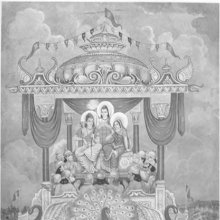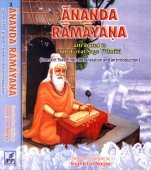Sumantra, Su-mantra: 10 definitions
Introduction:
Sumantra means something in Hinduism, Sanskrit, the history of ancient India. If you want to know the exact meaning, history, etymology or English translation of this term then check out the descriptions on this page. Add your comment or reference to a book if you want to contribute to this summary article.
Images (photo gallery)
In Hinduism
Purana and Itihasa (epic history)
Source: archive.org: Puranic EncyclopediaSumantra (सुमन्त्र).—A minister of king Daśaratha of Ayodhyā. The king had eight ministers called Jayanta, Dhṛṣṭi, Vijaya, Siddhārtha. Arthasādhaka, Aśoka, Mantrapāla and Sumantra and two priests called Vasiṣṭha and Vāmadeva. (Vālmīki Rāmāyaṇa, Bālakāṇḍa, Canto 7). Sumantra was the right-hand-man of Dasaratha in all his activities. It was Sumantra who brought down to the palace sage Ṛṣyaśṛṅga for the yajña conducted by the king to have issues. According to chapter 12, Virāṭa Parva of Mahābhārata (Southern Text) Sumantra was Daśaratha’s charioteer as well.
Source: archive.org: Shiva Purana - English TranslationSumantra (सुमन्त्र) is the name of a Gaṇanāyaka (“leader of Gaṇas”), according to the Śivapurāṇa 2.3.40 (“The Marriage Procession of Śiva”).—Accordingly, as Brahmā narrated to Nārada: “[...] Sumantra, the leader of Gaṇas, went with a crore of Gaṇas. Kākapādodara and Santānaka went each with six crores of Gaṇas. Mahābala, Madhupiṅga and Kokila each went with nine crores. Nīla and Pūrṇabhadra each went with ninety crores of Gaṇas. Caturvaktra with seven crores, Karaṇa with twenty crores and the leader of Gaṇas Ahiromaka went with ninety crores. [...]”.

The Purana (पुराण, purāṇas) refers to Sanskrit literature preserving ancient India’s vast cultural history, including historical legends, religious ceremonies, various arts and sciences. The eighteen mahapuranas total over 400,000 shlokas (metrical couplets) and date to at least several centuries BCE.
Kavya (poetry)
Source: Wisdom Library: KathāsaritsāgaraSumantra (सुमन्त्र) is the name of a minister of king Harivara, according to the Kathāsaritsāgara, chapter 52. Accordingly as Ambikā said to Jīvadatta in bodily form: “... and the king [Harivara] remained day and night with his mind fixed on her [Anaṅgaprabhā], and entrusted the great burden of his kingdom to his minister named Sumantra”.
The story of Sumantra was told by Gomukha in order to demonstrate that “divine beings fall by virtue of a curse, and, owing to the consequences of their own wickedness, are incarnate in the world of men, and after reaping the fruit appropriate to their bad conduct they again go to their own home on account of previously acquired merit”.
The Kathāsaritsāgara (‘ocean of streams of story’), mentioning Sumantra, is a famous Sanskrit epic story revolving around prince Naravāhanadatta and his quest to become the emperor of the vidyādharas (celestial beings). The work is said to have been an adaptation of Guṇāḍhya’s Bṛhatkathā consisting of 100,000 verses, which in turn is part of a larger work containing 700,000 verses.

Kavya (काव्य, kavya) refers to Sanskrit poetry, a popular ancient Indian tradition of literature. There have been many Sanskrit poets over the ages, hailing from ancient India and beyond. This topic includes mahakavya, or ‘epic poetry’ and natya, or ‘dramatic poetry’.
General definition (in Hinduism)
Source: Apam Napat: Indian MythologySumantra was the charioteer and one of the ministers of King Dasharatha of Ayodhya. It was he who suggests that the King utilize the services of the sage Rishyashringa to perform the Ashwamedha sacrifice. Dasharatha wanted to perform this sacrifice for the purpose of obtaining issue. [Rama:1.9]
India history and geography
Source: Cologne Digital Sanskrit Dictionaries: Indian Epigraphical GlossarySumantra.—(HD), king's counsellor on matters relating to income and expenditure. See Hist. Dharm., Vol. III, p. 114, note 150. Note: sumantra is defined in the “Indian epigraphical glossary” as it can be found on ancient inscriptions commonly written in Sanskrit, Prakrit or Dravidian languages.

The history of India traces the identification of countries, villages, towns and other regions of India, as well as mythology, zoology, royal dynasties, rulers, tribes, local festivities and traditions and regional languages. Ancient India enjoyed religious freedom and encourages the path of Dharma, a concept common to Buddhism, Hinduism, and Jainism.
Languages of India and abroad
Sanskrit dictionary
Source: DDSA: The practical Sanskrit-English dictionarySumantra (सुमन्त्र).—Name of the charioteer of Daśāratha.
Derivable forms: sumantraḥ (सुमन्त्रः).
Sumantra is a Sanskrit compound consisting of the terms su and mantra (मन्त्र).
Source: Cologne Digital Sanskrit Dictionaries: Cappeller Sanskrit-English DictionarySumantra (सुमन्त्र).—[adjective] well advised; [masculine] a man’s name.
Source: Cologne Digital Sanskrit Dictionaries: Monier-Williams Sanskrit-English Dictionary1) Sumantra (सुमन्त्र):—[=su-mantra] [from su > su-ma] mfn. following good advice, [Kathāsaritsāgara]
2) [v.s. ...] m. Name of a preceptor (having the [patronymic] Bābhrava Gautama), [Indische Studien by A. Weber]
3) [v.s. ...] of a minister and charioteer of Daśa-ratha, [Rāmāyaṇa]
4) [v.s. ...] of a counsellor of Hari-vara, [Kathāsaritsāgara]
5) [v.s. ...] of a son of Antarīkṣa, [Viṣṇu-purāṇa]
6) [v.s. ...] = su-mantraka, [Kalki-purāṇa]
[Sanskrit to German]
Sanskrit, also spelled संस्कृतम् (saṃskṛtam), is an ancient language of India commonly seen as the grandmother of the Indo-European language family (even English!). Closely allied with Prakrit and Pali, Sanskrit is more exhaustive in both grammar and terms and has the most extensive collection of literature in the world, greatly surpassing its sister-languages Greek and Latin.
Nepali dictionary
Source: unoes: Nepali-English DictionarySumantra (सुमन्त्र):—n. 1. auspicious mantra; 2. good or proper advice or suggestion;
Nepali is the primary language of the Nepalese people counting almost 20 million native speakers. The country of Nepal is situated in the Himalaya mountain range to the north of India.
See also (Relevant definitions)
Partial matches: Mantra, Cu, Shu.
Starts with: Sumantrajna, Sumantraka.
Ends with: Kisumamtra, Vishvavasumantra.
Full-text (+3): Sumantrajna, Sumantraka, Dhrishti, Dharmapala, Pratiharana, Mantrapala, Ashtamantri, Ardhasadhaka, Navati, Vimsha, Ashoka, Saptakoti, Navatikoti, Vimshakoti, Romaka, Ahiromaka, Karana, Jayanta, Abhyagata, Shakta.
Relevant text
Search found 26 books and stories containing Sumantra, Su-mantra; (plurals include: Sumantras, mantras). You can also click to the full overview containing English textual excerpts. Below are direct links for the most relevant articles:
Hanuman Nataka (critical study) (by Nurima Yeasmin)
9.3. The character of Sumantra < [Chapter 4]
9.11. The character of Kaikeyī < [Chapter 4]
9.5. The character of Daśaratha < [Chapter 4]
Ramayana of Valmiki (by Hari Prasad Shastri)
Chapter 57 - Sumantra returns to the stricken city of Ayodhya < [Book 2 - Ayodhya-kanda]
Chapter 16 - Shri Rama in his chariot drives swiftly to the king < [Book 2 - Ayodhya-kanda]
Chapter 52 - Sumantra is ordered to return < [Book 2 - Ayodhya-kanda]
Ramayana (by Manmatha Nath Dutt)
Chapter XII < [Book 1 - Bāla-kāṇḍa]
Chapter VIII < [Book 1 - Bāla-kāṇḍa]
Chapter XIII < [Book 1 - Bāla-kāṇḍa]
The Agni Purana (by N. Gangadharan)
The Padma Purana (by N.A. Deshpande)
Chapter 58 - Lakṣmaṇa Leaves Sītā in the Forest < [Section 5 - Pātāla-Khaṇḍa (Section on the Nether World)]
Chapter 11 - The Aśvamedha Horse Is Let Loose < [Section 5 - Pātāla-Khaṇḍa (Section on the Nether World)]
Chapter 243 - Rāma’s Consecration < [Section 6 - Uttara-Khaṇḍa (Concluding Section)]
Atithi or Guest Reception (study) (by Sarika. P.)
Part 6 - References to Hospitality in Bhāsa’s plays < [Chapter 4 - Atithi-saparyā in Classical Sanskrit Literature]
Related products


